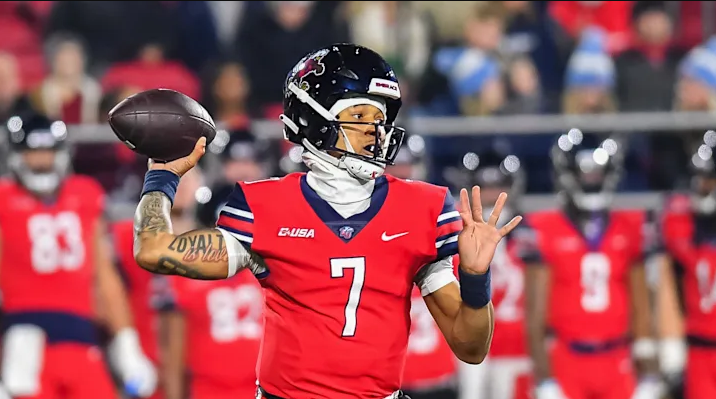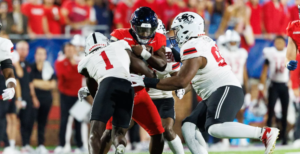
Flames Shine with Third Best Rushing Performance of the Year

The Flames faced a tough challenge during their recent matchup against Jacksonville State, a game that highlighted both their strengths and weaknesses. Despite a commendable rushing performance, Liberty ultimately fell short, losing 31-21 at Williams Stadium, marking the end of their impressive 12-game home winning streak. This defeat not only stings because of the immediate loss but also raises questions about the team’s ability to compete in a challenging Conference USA landscape.
The Flames showcased their capabilities on the ground, finishing the game with 273 rushing yards, which marked their third-best rushing performance of the season. Leading the charge was Quinton Cooley, who continued to establish himself as a key player for Liberty. With 27 carries for 133 yards and a touchdown, Cooley recorded his 12th career 100-yard game, underscoring his value as a reliable offensive weapon. His performance was a beacon of hope amid the frustrations that unfolded throughout the evening, demonstrating the Flames’ capacity for a potent rushing attack.
However, this impressive ground performance was not enough to secure victory. The game became a battle of wills, with Jacksonville State’s rushing game ultimately overpowering Liberty’s efforts. The Gamecocks, boasting the fifth-ranked rushing attack in the nation, finished with a staggering 363 rushing yards, eclipsing Liberty’s performance significantly. Tre Stewart emerged as the standout player for Jacksonville State, with a phenomenal game that saw him rush 27 times for 232 yards and four touchdowns. Stewart’s ability to exploit defensive gaps and break tackles was a decisive factor in the outcome of the game.
Liberty’s defensive unit struggled to contain Stewart, and this inability to stop the opposing run game proved costly. The Flames entered the game aware of Jacksonville State’s capabilities; after all, the Gamecocks had averaged 256.3 rushing yards per game prior to this matchup. However, the defensive schemes employed by Liberty were insufficient in countering the relentless assault from Jacksonville State. This issue raised questions about the Flames’ defensive strategy and execution, particularly in critical moments of the game.
The game began with a sense of optimism for the Flames, who were looking to extend their home winning streak and solidify their position within the Conference USA standings. Early on, the Flames appeared to be in a favorable position, utilizing their ground game effectively and establishing a rhythm. However, as the game progressed, Jacksonville State began to assert their dominance, showcasing a powerful running attack that wore down Liberty’s defense.
Midway through the fourth quarter, the tension reached a boiling point. Liberty was poised to make a critical stop on fourth down, which would have allowed them to regain momentum and potentially mount a comeback. However, Jacksonville State managed to convert the crucial fourth-down attempt, further demoralizing the Flames and securing their lead. This moment encapsulated the struggles Liberty faced throughout the game—despite flashes of brilliance, they could not consistently execute when it mattered most.
Kaidon Salter, Liberty’s quarterback, had a challenging evening, completing 12 of 25 passing attempts for 147 yards. Although he managed to lead the team with some effective passing plays, his performance was marred by an interception late in the fourth quarter as Liberty sought to rally and move the ball downfield. This turnover was particularly detrimental, as it snuffed out any hopes of a comeback and underscored the challenges faced by the Flames in the passing game. The pressure applied by Jacksonville State’s defense forced Salter into uncomfortable situations, limiting his ability to find open receivers and make plays.
On the defensive side, Joseph Carter and CJ Bazile, Jr. stood out with their tackling prowess, each recording 10 tackles to tie for team-high honors. For Bazile, this marked a new career high, showcasing his growth and development as a player. However, even individual performances like this were overshadowed by the overall struggles of the defense, particularly in containing the rushing attack of Jacksonville State. The Gamecocks effectively exploited the Flames’ weaknesses, forcing Liberty to adapt on the fly, often without success.
In the aftermath of this tough defeat, the Flames must engage in some serious self-reflection. The combination of a potent rushing attack and defensive shortcomings will require the coaching staff to reassess strategies and player roles as they move forward in the season. With a record of 5-2, the Flames still have an opportunity to compete within the conference, but consistency and execution will be vital.
The loss halted Liberty’s impressive home streak, which was the fourth-longest active FBS win streak in the country. This history of success at Williams Stadium had provided the team with a sense of security and confidence, making this defeat all the more impactful. The mental aspect of losing at home can weigh heavily on a team, and it will be crucial for the coaching staff to address any lingering doubts or concerns among players as they prepare for future matchups.
Looking ahead, the Flames must learn from this experience. They will need to focus on building a more balanced offensive strategy that can effectively complement their running game. While the ground attack led by Cooley is a significant asset, relying solely on it can be detrimental, especially when facing defenses that can adapt. Incorporating a more diverse passing strategy and finding ways to protect Salter will be critical as they face teams that will undoubtedly analyze the film from this game and aim to replicate Jacksonville State’s success.
Defensively, the Flames need to find ways to shore up their run defense. This means reassessing defensive alignments, tackling techniques, and overall schemes to ensure they can effectively counter potent rushing attacks like that of Jacksonville State. The coaching staff must also instill a mindset of resilience within the team, emphasizing the importance of executing in critical situations. Learning to respond positively to adversity will be vital for the Flames as they navigate the remainder of the season.
Moreover, the mental aspect of the game cannot be understated. Confidence is often a determining factor in performance, and after a loss like this, players may question their abilities and the team’s direction. The leadership within the locker room will be crucial in maintaining morale and focus as they move forward. Players will need to rally together, support one another, and build a renewed sense of determination as they prepare for the challenges that lie ahead.
However, while the Flames demonstrated their potential with a strong rushing performance, the loss to Jacksonville State served as a wake-up call. The stark contrast between the two teams’ rushing outputs highlighted the need for Liberty to improve their defensive strategies while continuing to develop a balanced offensive approach. As they strive to bounce back from this defeat, the Flames will need to focus on execution, resilience, and the mental fortitude required to succeed in the competitive landscape of Conference USA. With the right adjustments and a commitment to improvement, Liberty can still make a strong push in the season and aim for success in the games ahead.

Leave a Reply